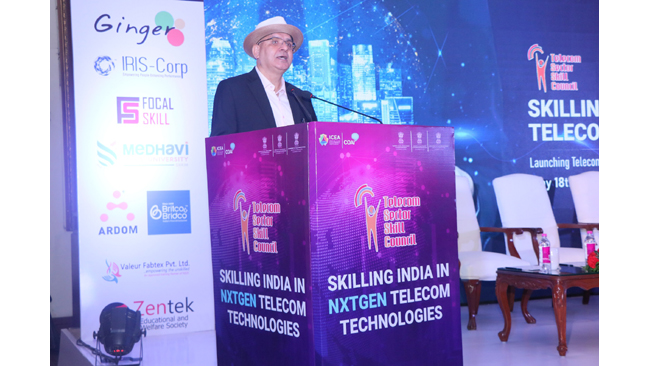
New
Delhi, 18th May, 2022.
The
Telecom Sector Skill Council (TSSC) – the Council responsible for skilling in
telecom, today launched a report ‘Overview: Indian Telecom Market 2022-23’,
charting out the areas of traction where the telecom industry would witness
growth in the coming financial year. The report highlights that in the past
year, there was a combined demand of over 1.5 lakh in roles in 5G, Cloud
Computing, AI & Big Data Analytics, IoT, Mobile App-Development and Robotic
Process Automation - the demand supply gap is almost 28%. The talent
demand supply gap will continue to widen with the advent of 5G and allied
technologies rollout. (For detail refer to
page no 70 of the report).
Also,
in view of India’s 5G rollout in the near future, TSSC has firmed up its plans
to boost skill infra and workforce along with its partners and stakeholders. It
plans to train 1 lakh people in the next 3 years and open 10 new Centres of
Excellence across the country.
The
launch event was attended by various dignitaries from the Ministries, Industry,
and Academia who deliberated the steps to be taken to achieve workforce
skilling and optimization for the next phase of India’s economic growth where
Telecom is an important pivot. The report launch witnessed the presence
of Shri Rajesh Aggarwal, Secretary, Ministry of Skill Development
and Entrepreneurship, Govt. of India, and Shri K Rajaraman,
Secretary, Department of Telecommunications, Govt. of India and Shri
Alkesh Kumar Sharma, Secretary, Ministry of Electronics and Information
Technology, Govt. of India.
Mr.
K Rajaraman, Secretary, DoT, said “India with a vast gamut of telecom
and network related services has an immense opportunity for skilling and
growth. A levelled progression in the skilling requirement will ensure
progression and a deeper look at the technological changes along with skilling
will ensure upgradation, make the workforce more relevant for future. This
would require a tremendous amount of follow ups within the IT systems with high
reliability which will enable affordable upskilling/reskilling. We hope to
address policy issues like low penetration of Broadband, RoW issues and the
industry needs to proliferate at CAGR of 30-40% in order to create phenomenal
jobs. TSSC should put in place set of occupational categories such as rural
broadband technician which can support the development of BharatNet withing the
country especially rural areas.”
“Opportunities
in 5G with the enormous use cases it will permit in industrial settings and
customer experience such as in AR/VR, IoT, etc and with its nature of
capabilities will require new range of skills required to manage use case
development. Hon’ble PM also been talking about opportunities in space
technology with new space startups and entities will ensure new range of jobs,”
he added.
Mr.
Rajesh Aggarwal, Secretary, MSDE said, “In next decades, technological changes
will be there but the human nature will remain the same. Telecom is embedded in
every sector such as entertainment, construction, agriculture, etc, right from
production to the distribution. It is important to train the workforce to use
these new technologies in a much more effective fashion. When we talk about
jobs in telecom sector, we should not talk about only the jobs here but how
they need some kind of upskilling.”
The
opening note was presented by TSSC President Mr. Akhil Gupta (Vice Chairman,
Bharti Group) to introduce the dais and various key speakers. “We have achieved
great success over the years in skilling the youth of India. We now plan to
accelerate skilling initiatives to international regions and map the
international workforce demand. We will achieve the Hon’ble Prime Ministers'
vision to make India the skill capital of the world, ” Mr. Akhil Gupta
Vice Chairman, Bharti Group said.
A
panel consisting of industry stalwarts like Dr. N. S. Kalsi (Chairman, NCVET),
Mr. Ved Mani Tiwari (COO, NSDC), Mr. Pankaj Mohindroo (Chairman, ICEA), Mr. P.
Balaji (CRO, VI), Mr. T. R. Dua (DG, DIPA) and Mr. Arvind Bali (CEO, TSSC)
discussed the rollout of 5G services and allied technology.
Mr.
Arvind Bali CEO, TSSC commented, “We are focused on providing the workforce
demand for the growth of 5G ecosystem in India. The ecosystem is seeing a big
influx of manufacturing units with approval for PLI in telecom equipment,
electronics, and handset manufacturing. With OEMs setting shop in India, they
will need a plethora of job roles to set up their supply chain. We aim to
aid the ecosystem with a world-class skilled workforce for 5G and its allied
technologies.”
TSSC
plans to expand its existing infrastructure with 10 new Centres of Excellence
across India and build the much-needed capacity to train a quality workforce on
futuristic technologies such as 5G, IoT, AI, ML, M2M etc. The organization will
utilize funds from industry CSR budgets and other initiatives. They plan to
expand to telecom manufacturing & service clusters where the need for a
skilled workforce is paramount.
In
addition to government schemes like PMKVY, DDU-GKY, NULM, ESDM etc., TSSC plans
to expand internationally through collaborations with African and the Middle
East nations. They are already in talks to launch courses recognized
internationally for conventional job roles like handheld device repair as well
as service-oriented job roles. In a staggered manner, advanced job roles will
be then cascaded to these international regions.